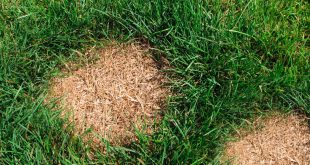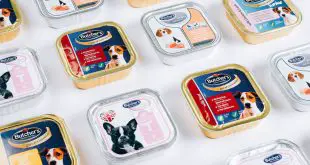This post may contain affiliate links. Please read our disclosure.
Every puppy owner wants the best for their furry friend, so finding the right food is essential. But with so many choices of dog food available, it can be hard to know where to start! Don’t worry – we’ve done all the research for you and put together a list of our top 5 picks for what we think is the best dog food for puppies. Read on to find out which one is perfect for your pup!
Article Contents
Nutritional Needs of Puppies
Raising a puppy is an amazing experience that comes with lots of responsibility. To ensure your pup grows up to be healthy and happy, you’ll need to provide them with the necessary nutrition to support their development.
Puppy food should be formulated specifically for puppies and contain quality ingredients like animal proteins, carbohydrates, fats, vitamins and minerals. Protein is especially important during this stage as it helps build muscle tissue and cells while providing energy. Fats are beneficial too because they help supply essential fatty acids which aid in normal growth and development as well as skin health. Carbohydrates provide quick energy that can help keep your pup feeling full longer between meals. Vitamins & minerals play an integral role in overall health by helping boost immunity, promote proper digestion & absorption of nutrients, ensure healthy teeth & bones plus much more!
When choosing a puppy food make sure it contains balanced levels of all these key nutrients so your pup can get everything needed for optimal growth & development. It’s also best to research brands carefully before making a decision since not all products are created equal when it comes to quality ingredients or nutritional value – look for those certified by the Association of American Feed Control Officials (AAFCO). Additionally, puppies have different caloric needs than adult dogs so make sure you select a formula designed specifically for their age group accordingly! Finally don’t forget about plenty of fresh water throughout the day – hydration is just as crucial as nutrition when keeping pups healthy & happy!
What is the Best Dog Food for Puppies
When it comes to finding the best food for your puppy, there are so many factors to consider. Not only is it important to ensure that they get all of their essential nutrients, but you also want something that will keep them healthy and happy in the long-term.
The first thing to look at when choosing a dog food for your pup is the ingredients list. Quality protein sources like chicken, beef, or fish should be near the top of the list – avoid foods with low quality fillers like cornmeal and wheat gluten. You’ll also want to make sure there’s plenty of fiber from vegetables and fruits as well as antioxidants from natural sources such as blueberries or carrots. The Omega-3 fatty acids found in certain types of fish oil are especially beneficial too: studies have shown that these can help reduce inflammation and support healthy skin & coat growth!
Additionally, don’t forget about vitamins and minerals; these are essential for proper development throughout life stages. Look out for added calcium which helps strengthen bones while zinc promotes healthier eyesight & hearing – both key areas of growth during a puppy’s early years! Finally, probiotics should always be included on any label: they aid digestion while boosting immunity against common illnesses like diarrhea or upset stomachs.
Top 5 Dog Food for Puppies
When it comes to feeding our furry friends, it’s important to choose a high-quality dog food that will provide all the necessary nutrients for their growth and development. Puppies have unique nutritional needs, and it’s essential to choose a food that will support their growth and development. Here are the top five dog foods for puppies that are sure to keep your pup happy and healthy:
- Blue Buffalo Life Protection Puppy Chicken and Brown Rice Recipe: This food is made with high-quality protein from real chicken and is formulated with DHA, an omega-3 fatty acid, to support cognitive development. It also contains wholesome whole grains, fruits, and vegetables to provide balanced nutrition.
- Wellness Complete Health Puppy Recipe: This food is made with high-quality proteins like deboned turkey and salmon and is formulated with DHA and EPA to support cognitive and visual development. It also contains a blend of antioxidants, vitamins, and minerals to support a strong immune system.
- Royal Canin Puppy Dry Dog Food: This food is specially formulated for large breed puppies and is made with high-quality proteins like chicken and rice. It also contains an exclusive complex of antioxidants to support a strong immune system and contains a balanced blend of nutrients to support healthy joints.
- Hill’s Science Diet Puppy Food: This food is made with high-quality proteins like chicken and is formulated with DHA and antioxidants to support cognitive development. It also contains a balanced blend of nutrients to support a healthy immune system and healthy skin and coat.
- Taste of the Wild Puppy Recipe: This food is made with high-quality proteins like wild boar and is formulated with DHA and antioxidants to support cognitive development. It also contains a balanced blend of nutrients to support a healthy immune system and healthy skin and coat.
When it comes to feeding your puppy, it’s important to choose a high-quality dog food that will provide all the necessary nutrients for their growth and development. These top five dog foods for puppies are sure to keep your pup happy and healthy. It’s also important to consult with your veterinarian to make sure that you are feeding your puppy the appropriate amount of food for their age, weight, and activity level. Puppies have unique nutritional needs and it’s essential to choose a food that will support their growth and development. So, take your time, do your research, and choose the best food for your furry friend.
Different Types of Puppy Food Available
When it comes to feeding our furry friends, there are so many types of puppy food on the market that it can be hard to know which one is best suited for your pup. From dry kibble and wet canned foods to freeze-dried raw diets, grain-free options, organic varieties, and more – how do you choose? Here’s a look at some of the different kinds of dog food available:
Dry Kibble: Dry kibble is the most widely available type of puppy food; many stores carry several brands. It’s usually made from meat meal or byproducts (such as chicken or fish), grains like corn or wheat, vegetables and fruits, vitamins and minerals. One benefit of dry kibble is that it helps keep teeth clean through brushing action during chewing. However, because some commercial brands contain artificial colors and preservatives they may not be suitable for all dogs.
Wet Canned Food: Wet canned foods have higher moisture content than kibbles but are still shelf stable until opened. This type of food often contains chunks or shreds in gravy or jelly; these varieties tend to be high in protein with added carbohydrates such as rice or potatoes plus fats for energy production along with vitamins/minerals for healthy development. Like dry kibbles this type also keeps teeth clean but may require refrigeration after opening due to its higher moisture content so check labels before purchasing!
Freeze-Dried Raw Diets: Freeze dried raw diets come pre-portioned into individual meals ready for quick preparation at home – simply add warm water to rehydrate them back into their original form! These meals usually contain only fresh ingredients with no added fillers like starches; instead they offer an array of proteins such as beef, lamb, turkey & salmon along with fruits/veggies plus essential fatty acids from fish oil among other beneficial nutrients important in canine health maintenance! Additionally they are 100% natural so there’s no need worry about any potentially harmful chemicals entering your pup’s system via their diet either – win win situation right here folks!
Grain-Free Options: As the name implies these products don’t include grains like wheat gluten soy etc.. This can make them a great choice if your pooch has sensitivities allergies intolerances towards certain grains While traditionally grain free recipes might rely heavily on potato pea flours they are now being reformulated using alternative sources such as chickpeas lentils sweet potatoes oats quinoa buckwheat etc making them much closer nutritionally speaking compared regular ‘grain full’ formulas… Not forgetting that same satisfying crunchy texture too – bonus!!
Organic Varieties: Organic puppy foods must meet strict standards set by certifying bodies ensuring only non GMO ingredients get used i e nothing artificially created modified Or tampered with For example you will find wholefood based proteins plant oils herbs spices fruits veggies nuts legumes kelp probiotics etc In short everything present should be naturally occurring elements found nature = peace mind knowing what exactly going down fur baby tummy
Key Ingredients for Puppy Health
Having a puppy can be one of life’s greatest joys. But along with that comes responsibility; an obligation to ensure their health and wellbeing. To help, here are some key ingredients for puppy health:
Nutrition is top priority when it comes to keeping your pup healthy. While pre-made meals are convenient, they don’t always provide the optimal nutrition needed for them to be in their best shape. Instead, seek out dog food options which include high quality proteins like chicken or salmon as well as vegetables such as carrots and green beans. Not only will this keep your pup feeling full and energized but also give them all the vitamins (A, B1 & B2) they need to stay strong throughout their lives. Additionally, you should look into supplements tailored specifically for puppies – these can help fill any nutritional gaps in their diet that may not be met by regular kibble alone.
Exercise is another critical component of a happy and healthy puppy life! Regular walks around the neighborhood can do wonders for both mental stimulation and physical activity – two things vital for young pups who still have growing bones and forming brains. Other activities suitable for younger dogs include playing fetch in the yard or even swimming if possible! Swimming has been known to improve joint mobility while being easy on young joints at the same time – making it perfect exercise choice when looking at what’s best suited long term health wise Lastly make sure you take regular breaks during playtime so they don’t tire themselves out too quickly or become overly excited leading potential injury risks
• Nutrition Priority
• High Quality Proteins & Veggies
• Tailored Supplements For Puppies
• Regular Exercise (Walking/Fetch/Swimming)
• Breaks During Playtime
Considerations When Choosing a Puppy Food Brand
Picking the right food for your new puppy can be a daunting task. With all of the brands out there, it’s hard to know which one is best suited to your pup’s needs, especially when they are so young and growing. Here are some things to keep in mind while searching for the perfect puppy food:
• Nutritional Value: A good quality puppy food should have high nutritional value with plenty of vitamins and minerals that are essential for their growth and development. Look at the label closely to get an idea of what ingredients you will find in each brand. This can provide an indication as to how healthy or unhealthy a certain brand might be for your pup’s diet.
• Ingredients: Pay attention to what kind of ingredients make up a particular product; many foods include artificial colors, flavors or preservatives which may not always be beneficial for puppies who need high levels of protein and other nutrients during this critical period in their lives. Choose products that use only natural ingredients such as fresh fruits and vegetables, lean proteins, whole grains or organic sources whenever possible.
• Price Point: While cost shouldn’t be the only factor when selecting a food for your pup, looking into different price points is important; some premium brands may offer more benefits than others but could come with a higher price tag attached as well – striking a balance between cost-effectiveness and quality nutrition is key here! It’s worth taking time to shop around before making any commitments too since prices vary quite significantly from store-to-store even within same brands/products!
Benefits of Wet vs Dry Foods for Puppies
When it comes to deciding on the best food for your puppy, both wet and dry foods have unique benefits. Wet food is typically more palatable than dry kibble, making it a great option for picky eaters. It can also be easier for puppies who are just starting to chew solid foods as the texture of wet food is softer and more forgiving than kibble. The moisture content in wet food may also lead to better hydration, which is especially important during summer months when puppies become overheated easily.
On the other hand, dry dog food offers its own set of benefits. Many brands offer specialized formulas with specific nutritional profiles that cater to different breeds and life stages of dogs – so even if you’re not comfortable preparing meals from scratch at home, you still have options tailored specifically to your pup’s needs. Dry kibble has been designed with dental health in mind; chewing on hard pieces helps keep teeth clean while scraping away plaque buildup between meals. Plus because it lasts longer without spoiling or going stale compared to canned foods – meaning fewer trips to the store!
To make sure your puppy receives all the nutrients they need throughout their growing years – consider feeding them a combination of both wet and dry foods! Here are some advantages that each type provides:
• Wet Food: Soft texture makes it easier for puppies who are just starting out eating solids; increased moisture content may help keep them better hydrated; appealing taste often encourages finicky eaters
• Dry Kibble: Wide variety available including specially-formulated recipes tailored towards different breeds/life stages; crunchy texture helps clean teeth & freshen breath; shelf-stable quality means less frequent shopping trips
Common Allergens in Dog Foods for Puppies
Raising a puppy can be filled with joy, but also challenges. One of those challenges is the risk of allergies. Food allergies in puppies can cause skin irritation, gastrointestinal issues, and other health problems if not taken seriously. Knowing what to look for when choosing the right food for your pup is key to ensuring their overall health and happiness.
Common allergens found in dog foods include wheat, corn, soybeans, dairy products, eggs and chicken byproducts. These ingredients are often used as fillers or binders in many pet food brands and should be avoided whenever possible. Wheat gluten is another allergen that often lurks within certain forms of kibble or canned wet food which could lead to digestive upset if consumed regularly over time by sensitive pups.
In addition to these common allergens it’s important to note that some lesser known items like beef hide chips may contain proteins that could trigger an allergic reaction in some dogs as well as artificial flavors and colors which may contain preservatives such as BHA/BHT (butylated hydroxyanisole/butylated hydroxytoluene) which have been linked with causing adverse reactions in pets due to their toxicity levels when ingested over long periods of time . There are many natural alternatives available today made from wholesome sources such as sweet potatoes or pumpkin so you don’t need to worry about these potential hazards lurking inside your pup’s meals anymore!
When shopping for dog food always read labels carefully before making purchases – avoiding any ingredients listed above will help reduce the chance of developing an allergy-related illness down the line! Here are a few tips on how best avoid common allergens:
• Choose foods labeled “allergen-free” or “limited ingredient diet” whenever possible
• Look out for organic options without added chemicals or preservatives
• Opt for grain-free varieties instead of traditional dry kibbles containing wheat/corn fillers
• Read ingredient lists thoroughly prior purchase
Wrap up!
In conclusion, it is important to understand the nutritional needs of puppies so that pet owners can make an informed decision about what food will best suit their pup. There are many different types and brands of puppy food available, and each one contains key ingredients for puppy health. Pet owners should also consider wet vs dry foods as well as common allergens in order to choose a brand that suits their pup’s needs. Finally, transitioning puppies from specialized puppy food to regular dog food requires patience and understanding in order to ensure a smooth transition for your furry friend!
FAQ on Dog Food for Puppies
What is the best pet food for puppies?
The best dog food for puppies should be nutritionally balanced and specific to the breed, size, and activity level of your pup. Look for food that has an appropriate ratio of protein, fat, carbohydrates as well as vitamins and minerals.
What is the most common type of food allergy in dogs?
The most common type of food allergy in dogs is usually caused by proteins such as beef, chicken, eggs or dairy products. Other potential culprits include wheat gluten and corn-based ingredients. Talk to your veterinarian about a diet designed specifically for your pet’s needs if you suspect a food allergy.
How often should I feed my puppy?
Puppies need three meals per day up until they are six months old. After that age it’s recommended that you switch them over to two meals daily (morning and evening). Make sure each meal contains all the necessary nutrients needed for healthy growth!
Are raw diets safe for puppies?
Raw diets may be suitable if done correctly but they come with some risks – including nutritional deficiencies or contamination from bacteria like salmonella or E coli which can make both people and pets sick. Therefore it’s important to do plenty research before deciding on this option; consult with a board certified veterinary nutritionist if possible.
What kind of treats can I give my puppy?
When giving treats aim to keep them small so they don’t upset the balance between their regular meals; around 10% maximum each day is ideal! You could try plain cooked chicken breast pieces or low-fat cheese cubes depending on what your pup likes best – just remember not all treats are equal so check labels carefully first!
 Petnile Comprehensive Pet Care Guides
Petnile Comprehensive Pet Care Guides



